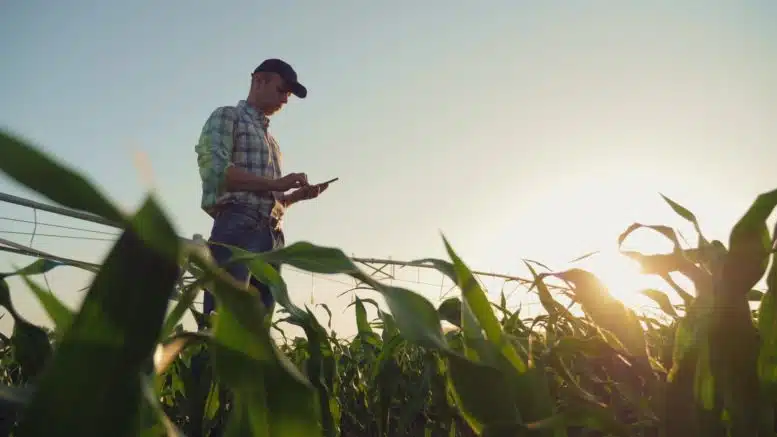By Jaymie Baxley
Many of the state’s more than 75,000 farmworkers lack high-speed internet, limiting their access to digital services that have been shown to improve health outcomes for people in rural communities.
The N.C. Department of Health and Human Services’ Office of Rural Health hopes to address the divide with a “digital equity initiative” funded by the National Institutes of Health. Over the next five years, DHHS will receive nearly $6 million from the federal agency to help connect agricultural workers and their families to affordable broadband.
“Internet is an essential utility,” said Natalie Rivera, project manager for the initiative. “It’s part of, really, the social determinants of health in ensuring that folks have access to things like health education resources, or that they’re just able to communicate with their families.”
While farmers and farmworkers have long been hindered by gaps in the state’s broadband infrastructure, the COVID-19 pandemic brought the issue into sharper focus. Rivera said DHHS began “trying out different things to ensure that farmworkers had access to the internet” during the pandemic.
One of the more successful experiments involved partnering with local organizations to lend mobile hotspots to workers in migrant camps, which are not required to provide internet under current migrant housing standards. But without access to the internet, migrant workers are often “unable to reach healthcare providers, communicate about outbreaks, request outreach services and stay in touch with family and loved ones,” according to the N.C. Farmworker Health Program website.
“We wanted to make sure that community health workers could still be in contact with them,” Rivera said of the hotspot lending program. “Obviously we had safety in mind because, at that time, foreign workers were at really high risk to the spread of infectious disease because of congregate housing.”
Hoping to build on that experience, DHHS applied for funding through the NIH’s Common Fund Community Partnerships to Advance Science for Society program. Stylized as “ComPASS” in publicity materials, the newly launched program seeks to “enable research into sustainable solutions that promote health equity to create lasting change.”
“We saw that there was an opportunity there to enhance telehealth and internet access, and that’s exactly what we’re trying to do,” Rivera said. “We don’t want this to just be an effort for COVID. We need to make sure that this continues and that we’re working on closing the digital divide that farmworkers experience.”
In late September, DHHS learned that its proposal was among the 26 projects selected for funding. The department has enlisted East Carolina University and North Carolina State University as research partners for the initiative.
“This investment from the National Institutes of Health will transform the health and well-being of our state’s agricultural workers who ensure the nation’s food security,” Kody H. Kinsley, head of the state DHHS, said in a statement after the award was announced. “This collaborative effort will help close the health care coverage gap by increasing access to care when and where workers and their families need it.”
First steps
Rivera said the first two years of the five-year project will be spent conducting a “community assessment,” with researchers gathering feedback from agricultural workers and health care providers to determine what the next steps should be.
“It’s really to understand more about their challenges around not only internet access, but also telehealth,” she said. “This is a community-led project, and we don’t want to just come up with something and say, ‘Oh, this is what will work.’ We really want to make sure we’re making an impact.”
After that, the initiative will enter what Rivera called the “intervention phase.”
“We don’t fully know yet what that will look like,” she said. “I think we’ll be able to uncover some of the biggest challenges and, with everyone’s help, we can decide what are the best options for moving forward with interventions to support both internet access and telehealth.”
While Rivera acknowledged that DHHS “may not be able to necessarily lay lines” connecting workers to high-speed internet, she said the agency will work closely with the N.C. Division of Broadband and Digital Equity to “make sure farmers are included in plans to expand” service in the future.
“When we put together this application, a real emphasis was on enhancing digital health because it’s a huge topic and it is changing and evolving as we speak,” she said. “But we also have to add in that layer of [improving] internet access because it is such a big challenge as well.”
National issue
Agriculture is a $100-billion-a-year industry for North Carolina, and the sector is intrinsically tied to the livelihood of several of the state’s rural counties. The U.S. Department of Agriculture reports that North Carolina was the ninth largest state in terms of cash receipts from agriculture production in 2022.
Nationally, farmworkers are at increased risk of certain health issues. They suffer from higher blood pressure and are more likely to contract infectious diseases than people in other occupations, according to the N.C. Farmworker Health Program.
Mental health is also a concern. About 40 percent of farmworkers experience depression, and 30 percent report feelings of anxiety.
Rivera hopes the digital equity initiative can serve as a template for other states that rely heavily on agriculture.
“That’s really what’s exciting about this thing,” she said. “It’s a national award that we can learn from and hopefully spread the information to folks across the nation so that other people can implement this.”
She added: “This isn’t just an exclusive issue to North Carolina. I can only imagine the broadband challenges across other states.”














